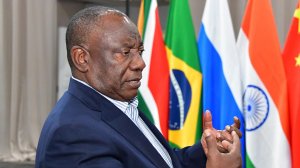President Cyril Ramaphosa noted on Tuesday that despite difficult global conditions, investors continue to see value in the South African economy and the benefit of the reform agenda government is pursuing.
Ramaphosa wrote in his weekly letter to the nation, expressing delight that the Brics Business Forum held last week was attended by 1 500 investors and businesspeople from all five member countries.
“We were able to showcase the potential of South Africa and the African continent as the next frontiers of productivity and growth. Many of the participants remarked on the enormous potential of our economic reform agenda to drive growth in the green economy, the digital economy, and other key sectors,” he said.
This week government released a progress report on the economic reforms implemented through Operation Vulindlela, a joint reform initiative of the Presidency and National Treasury.
Ramaphosa explained that since Operation Vulindlela was established, there has been significant momentum in economic reforms to create growth and jobs.
“Through these reforms we are steadily laying the foundation for a revival of economic growth. By restructuring our network industries like energy, telecommunications, ports and rail, we are opening the space for investment and a renewal of our nation’s infrastructure,” he said.
He noted that the first reform milestones included the digital migration process, which saw switching off analogue transmission for all frequencies above 694 MHz on July 31, 2023.
The implementation of this reform would bring new investment in the telecommunications sector, he said.
Ramaphosa explained that work was underway to implement necessary reforms in the logistics sector to address the challenges that had held back the growth of South African exports.
He said a key milestone was reached with the selection of an international terminal operator to partner with Transnet at the Durban Container Terminal Pier 2, which handles almost half of South Africa’s port traffic.
“This partnership will increase investment for upgrading equipment and expanding terminal capacity. A key aspect of this partnership is that port infrastructure will remain State-owned and all jobs will be protected,” he added.
NEW INVESTMENTS
Meanwhile, he noted that two critical pieces of legislation were tabled in Parliament this month, which he said would advance economic reform.
The Electricity Regulation Amendment Bill seeks to support the restructuring of Eskom into three separate companies owned and controlled by Eskom Holdings, including an independent grid operator.
Ramaphosa said through this Bill government would iintroduce competition in electricity generation, enabling a number of independent generators, alongside Eskom, to produce electricity to meet demand.
“This reform will fundamentally transform, modernise and improve South Africa’s energy sector to ensure energy security into the future,” he believes.
The reforms implemented through the Energy Action Plan have unlocked new investment in renewable energy sources to end loadshedding and power economic growth.
Another key reform government had prioritised was in the water sector, he said.
“We have introduced the South African National Water Resources Infrastructure Bill to establish a dedicated national water agency to design, plan and finance water resource infrastructure,” he added.
Ramaphosa highlighted that this agency would enable significantly greater investment in bulk water infrastructure to guarantee water security for decades, while creating jobs and unlocking new agricultural potential.
He said other reforms to unlock economic growth included creating an enabling regulatory environment for hemp and cannabis production and eradicating the backlog of title deeds for subsidised housing.
EMAIL THIS ARTICLE SAVE THIS ARTICLE ARTICLE ENQUIRY
To subscribe email subscriptions@creamermedia.co.za or click here
To advertise email advertising@creamermedia.co.za or click here











